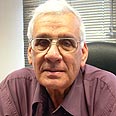
Knesset to discuss Armenian genocide
Knesset accepts Oron's initiative, will discuss mass murder of 1.5 million Armenians during early 20th century. Oron: 'Certain ethical dilemmas cannot be avoided.' Jerusalem officials warn of Turkish reaction
In an unprecedented move, the Knesset decided on Wednesday to appoint a committee to discuss the Armenian genocide that occurred during World War I.
The decision was based on a bill proposal made by Meretz-Yahad Chairman Chaim Oron. Eleven Knesset members voted in favor of the proposal, none opposed or abstained. Oron requested that the Knesset's Education Committee hold the discussion.
Armenian genocide remembrance day ceremony. (Photo: AP)
"It is only proper that the Knesset, which officially represents the Jewish people, recognize the Armenian genocide," said Oron. "It is especially important at present, as we are dealing with so many cases of Holocaust denial. There are certain ethical dilemmas that cannot be avoided. I am aware of Turkey's objection to the matter, but I believe this is a subject that the Knesset must discuss."
Knesset Member Zeev Elkin (Kadima) said, "I am proud of our efforts, which have brought on this historical achievement, and which other parliaments in the world have succeeded in doing a while ago. Israel should have been among the first countries in the world to recognize this genocide."
State officials warn of tensions with Ankara
Senior State officials in Jerusalem told Ynet on Wednesday evening they believed the decision to be "out of place and undesired." In similar attempts to agree on such things in the past, said the officials, the Foreign Ministry and coalition "got on their hind legs to avoid any embarrassment."
The sources said however that the ministry must clarify its position and not try to silence the Knesset.
"We believe that the Turks will not be perturbed by the debate itself but rather with its practical sides. Past experience teaches they want to know what level the discussion is being held on and what implications it will have on Israeli policy," said the officials in Jerusalem, stressing that Israel's official stance has not changed.
"Israel's position is that we are aware of the tragedy that befall the Armenian people. There are contradictions in the versions told by those involved in regards to the historical recollection of what occurred," they said.
The Armenian genocide
90% of the Armenian population residing within the territories controlled by the Ottoman Empire were murdered or deported during the massacre. An estimated 1.5 million Armenians were murdered or died of starvation and disease during the period between 1894 and 1918.
The slaughter of the Armenian people is considered by many to be the first genocide of large proportions of the 20th century. Turkey has denied reports of the massacre, calling the event a war with the Armenian people and claiming that many of the Armenians were simply transferred to different areas of the empire.
April 24 marks an international day of remembrance for the Armenian genocide, and every year Armenians from all over the world gather to mark the occasion.
In October 2007 the US Senate Committee on Foreign Relations approved a bill naming the slaughter of the Armenians genocide. Prior to the vote on this matter, US President George Bush said that the bill was not the answer to the massacre, and that its approval was likely to damage relations with Turkey.
In October of 2006 Turkey suspended its military relations with France due to a French law passed, making the denial of the Armenian genocide illegal in the country.
Roni Sofer contributed to this report











